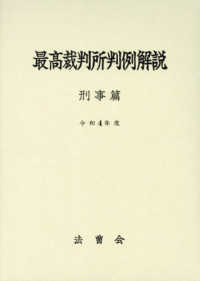- ホーム
- > 洋書
- > 英文書
- > Philosophy
基本説明
Develops a unified moral theory that defends the hedonism of classical utilitarianism while evading utilitarianism's familiar difficulties.
Full Description
In Goodness and Justice, Joseph Mendola develops a unified moral theory that defends the hedonism of classical utilitarianism, while evading utilitarianism's familiar difficulties by adopting two modifications. His theory incorporates a developed form of consequentialism. When, as is common, someone is engaged in conflicting group acts, it requires that one perform one's role in that group act that is most beneficent. The theory also holds that overall value is distribution-sensitive, ceding maximum weight to the well-being of the worst-off sections of sentient lives. It is properly congruent with commonsense intuition and required by the true metaphysics of value, by the unconstituted natural good found in our world.
Contents
1. Introduction; Part I. A Better Consequentialism: 2. Multiple-act consequentialism; 3. Three objections; Part II. Hedonism: 4. Intuitive hedonism; 5. Natural good; Part III. MAXIMIN: 6. Just Construction; 7. Maximin, risks, and flecks; Part IV. Advice for Atomic Agents: 8. A coda.







